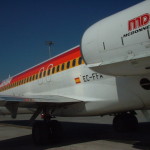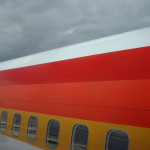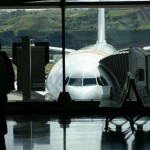Iberia has implemented a severe contingency plan in response to the steep decline in demand and revenues, after posting a loss of 92.6 million euros in the first quarter of 2009.
Madrid – The plan will enable the company to cut losses by between 110 and 125 million euros, and it also foresees an 80-90 million reduction in investment spending. It includes four types of measures: a cutback in capacity, a reduction in labour costs, a reduction of purchases and external costs, and a review of the investment programme, aimed at postponing all investments not related to improving customer services or having a direct impact on earnings.
Apart from reducing seat-kilometre supply capacity, as already announced, cost-cutting measures include the following:
· Temporary layoffs, about which talks with the unions are now in progress. They will cut across the entire company, but will especially affect the areas worst hit by the decline in activity.
· Temporary hiring contracts will not be renewed, and all new hiring will be frozen. Payroll containment measures are under study, along with a moratorium on pay rises and a freeze of executive salaries.
· Spending on rented office space will be cut and the company will relinquish buildings and industrial and airport spaces, making better use of remaining properties. These reductions are expected to amount to reach a total of some 20.000 square metres.
· The company’s fleet of ground vehicles used for transport between its industrial installations will be cut.
· All supplier contracts will be reviewed not only to reduce prices but also to seek ways to adapt commercial relations to current circumstances.
· Spending on technical consultants will be cut back.
· IT developments will be postponed, excepting those directly related to operations.
The company estimates that these measures will bring about a savings of between 110 and 125 million euros on the profit and loss account.
Meanwhile, all investments that are not related to improving customer services, or that have no direct and immediate impact on earnings, are to be put on hold, for an additional savings of between 80 and 90 million euros. Specifically, this means that:
· Construction of the crew signing building at Madrid-Barajas will be postponed, along with several renovation projects at Iberia offices abroad and in the cargo building.
· All planned investments in IT will be reviewed, and those not linked to operations will be postponed.
· However, all investments aimed at improving services to customers will continue, such as the spending of 7 million euros to improve VIP lounges at the Madrid hub and elsewhere. The renovation of tourist class on long-haul aircraft will also go ahead.
Capacity cuts will be selective and temporary, and will not entail withdrawal from any markets, but merely a temporary reduction of frequencies in periods and time slots when demand is lowest. Strategic routes will not be affected. Accordingly, effective in this month of May, Iberia will withdraw five Airbus A320s from service. The delivery of new aircraft will be postponed, those operating under wet lease will now be flown by Iberia and smaller aircraft will be used on some routes and time slots.
The aim of all these measures is adapt quickly to the current environment and to emerge strengthened, having protected the most important markets and the company’s financial strength, as well as the P&L account.
First Quarter Results
The Iberia Group posted a consolidated loss of 92.6 million euros in the first quarter of 2009, chiefly due to the deep impact of the world economic recession on the air transport industry.
Operating earnings declined by 15.6 per cent on the weakness of air traffic in most international markets, and especially in Spain’s domestic market. This was aggravated by a steep decline in business travel, and strong downward pressure on fares.
Other extraordinary factors, such as the disruptions caused by the work-to-rule by pilots and severe snowstorms in January, also had a negative impact on the quarterly accounts.
The 6.1 per cent reduction in seat-kilometre supply was outstripped by a 9.5 per cent decline in demand. This pushed down the passenger load factor by 2.9 points from the 2008 average, to 76.5 per cent, although this was still the highest among comparable European airlines.
Operating costs were 6.3 per cent lower than those of the same quarter a year ago, with declines in nearly every item, which helped offset the drop in revenues.
The number of employees was reduced by 4 per cent than in Q-1-08, and the aircraft fleet utilisation rate climbed by 3.4 per cent to a company record of 10 hours per/aircraft day.
Aircraft maintenance services to third parties continued to grow, posting a 6.3 per cent rise over same-2008, and accounting for 7.2 per cent of total operating revenues in the quarter.
The company’s equity position remains strong, and it boasts a large balance of disposable current assets (short-term financial investments and cash), amounting to 2,252.3 million on March 31st, 2009.





